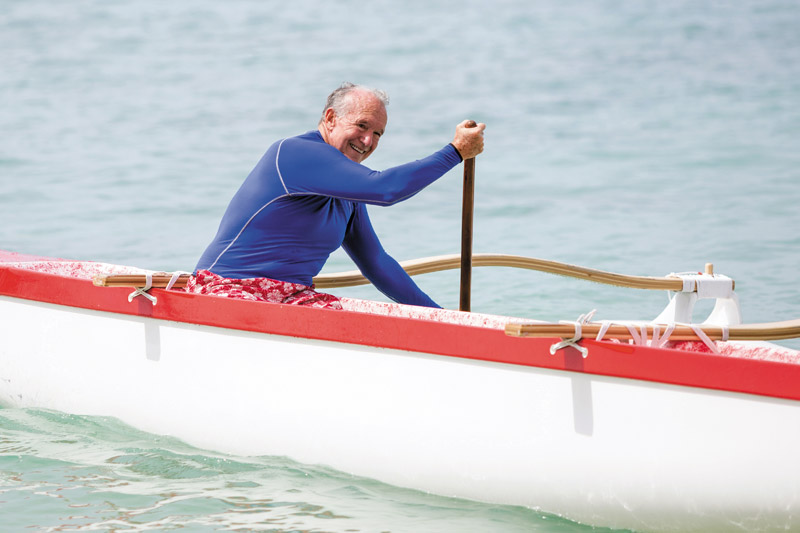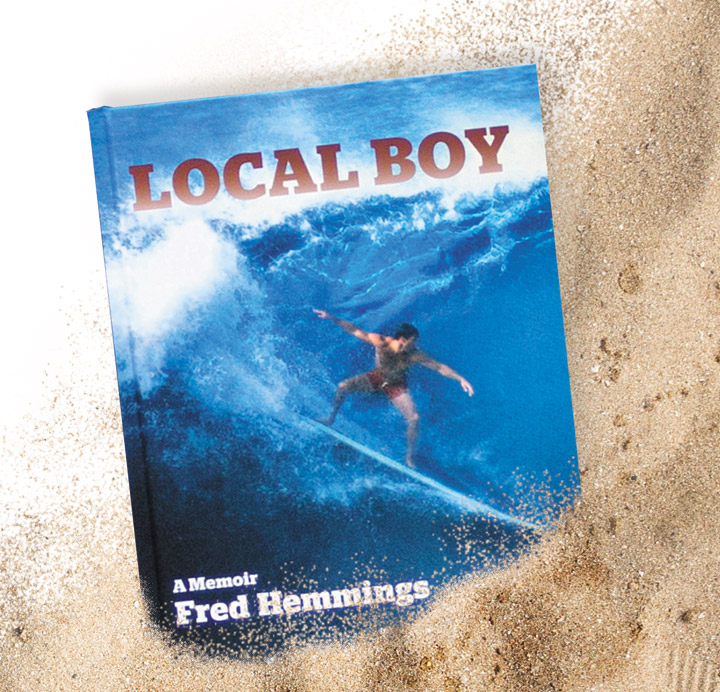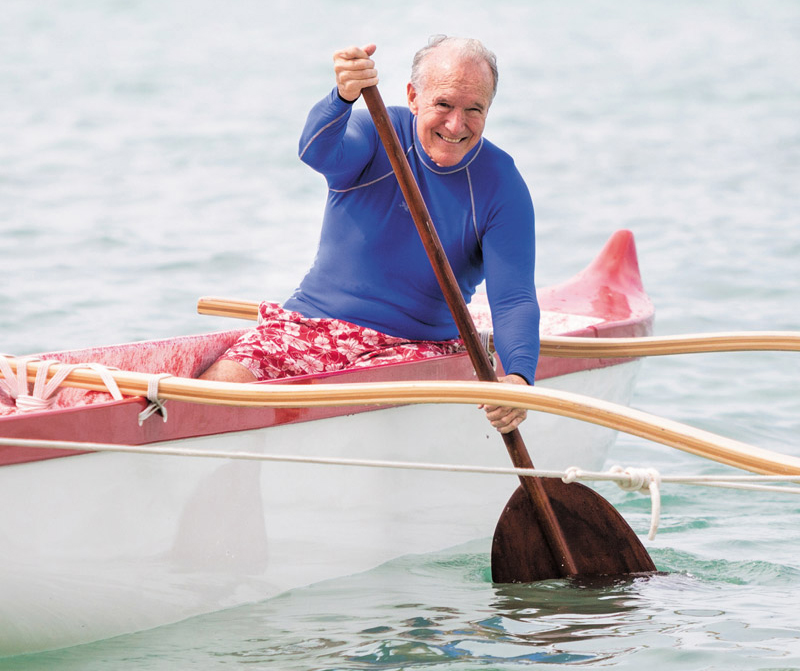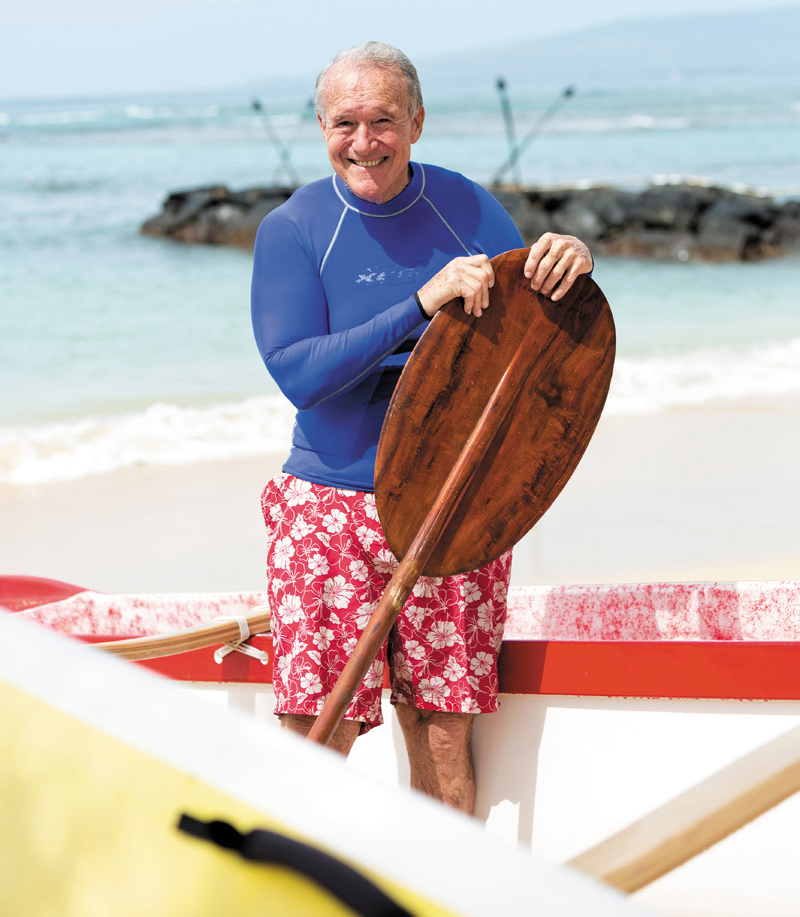The Book On Fred Hemmings

It’s another chapter in the life of Fred Hemmings, the former champion surfer, politician and now author, as he recounts his personal journey in the book “Local Boy, A Memoir.”
Fred Hemmings has been making waves all his life. As a water sportsman, entrepreneur, statesman and family man, his influence ripples through the community.
At age 72, he’s riding the crest of life and now has a book to share his stories and experiences, titled Local Boy, A Memoir. It is 120 pages of easy reading and chatty anecdotes about his “wondrous” childhood and “fateful” adulthood.
Surfer dude Hemmings knows it takes wind to make waves — and that it takes being Portuguese to master the convivial art of story telling.
“I have a lot of fun in my life being Portuguese,” he writes in the opening chapter. “Hawai‘i is unique in so many ways and one prominent way is that it is a state of ethnic minorities, in which no one group reigns supreme — unless you care to acknowledge that the Portuguese are truly God’s chosen people. Just kidding!”
References of being Portuguese pop up randomly in his book, adding spunk and levity to the personal journey.
The family of Hemmings’ mother, Lillian Bernice Freitas Hemmings, arrived in Hawai‘i in 1883 from Madeira, Portugal. She married Brooklynite Frederick Matthew Hemmings Sr. (“Big Fred”) of English, Irish and Indian descent.
“I was one of six half-Portuguese children,” the author says. “But this book is not so much about me as it is about Hawai‘i.”

In his book Local Boy, A Memoir, Hemmings recalls paddling feats performed at the Outrigger Canoe Club.
Indeed, it is a delightful reflection of old and new Hawai‘i as seen by a kid who was brought up on Farmers Road in Kāhala. During Hemmings’ youth, Wai‘alae Avenue was a two-lane road that weaved its way out to Kuapā Pond and Portlock in East O‘ahu. It was the main thoroughfare from town. There was no Hawai‘i Kai.
“Where Kāhala Mall now stands was nothing but an empty field overgrown with weeds,” he recalls.
From Kāhala, the family moved to Kuli‘ou‘ou Valley, where “we had great adventures exploring Kuli‘ou‘ou and Kuapā Pond with small canoes made by bending a corrugated 4by 8(-foot) sheet of roofing material.”
Little did he know then that canoe paddling and surfing would figure prominently into his destiny as an ocean sportsman. Nor did he envision the technological advances that surfing would make years later, such as manmade wave machines and polyurethane foam boards that allow surfers to soar. Thanks to artificial waves, surfing will debut as an Olympic event in 2020 at Tokyo.
Yes, little ripples become big waves.
BUFF ‘N BLUE
Hemmings and his siblings studied at Catholic schools until the sixth grade, then went on financial scholarships to Punahou.

“Punahou is a real blessing to Hawai‘i,” he says. “It plants the seeds of some great people.”
Among them was a legendary Punahou quarterback in the ILH championship game against Kamehameha at Honolulu Stadium in 1964.
“My claim to fame in football was centering the ball to one of the greatest ILH players of all time, Charlie Wedemeyer,” Hemmings says proudly.
“With fondness I remember all our coaches — Ralph Martinso, Dave Eldredge, Chubby Vicens and the indomitable Charley Ane. Coach Ane taught his boys some of life’s toughest lessons that cannot be learned in a classroom — that is, how to win humbly and, maybe more important, how to lose gracefully,” Hemmings reflects.

An avid water sportsman, Hemmings, 72, still fi nds the time to enjoy one of his favorite pastimes: canoe paddling.
Those values would carry over to professional pursuits in sports, broadcasting, politics and business.
Hemmings’ memoirs include vivid accounts of canoe paddling feats at the Outrigger Canoe Club, endearing friendships with famed Waikīkī beachboys led by Olympian Duke Kahanamoku, winning the Mākaha International Surfing Championship four times as well as the World Surfing Championship title in 1968, establishing surfing as a professional sport with the founding of the Pipeline Masters in 1971, and competing in the most rigorous sport of them all: politics.
IMPACT ZONE
In the chapter titled “Politics Is Not a Dirty Word,” Hemmings recounts his demanding yet exhilarating ride through government service.
From 1984 to 1990, Hemmings was a Republican leader in the House of Representatives. In 2000, he was elected to the state Senate, where he served as senate leader. He ran for lieutenant governor in 1994, teamed with Pat Saiki, and lost a gubernatorial bid in 1990 to Democratic incumbent John D. Waihee III.
From whistleblowing on corrupt public officials to monumental efforts to establish the world’s largest marine reserve in the northwestern Hawaiian islands, Hemmings knows how to navigate choppy seas.
“Not many slippah-wearing local boys have dined with the president in the White House,” he muses.
As a negotiator and policy-maker, Hemmings found strategic ways to navigate the often-entrenched political system in Hawai‘i.

“You have to give and take to have a healthy two-party system,” he says. “Monopolies are unhealthy because they take away accountability and competition.”
The political imbalance has major economic consequences, he contends. “It’s hard to achieve a balance when the takers (entitlement) outnumber the makers.”
But like a determined surfer, one just keeps paddling out to sea, knowing the next wave is coming.
‘A’AMA CRAB SYNDROME
From tourism-carrying capacity, rising housing costs, social challenges, including homelessness, to science versus cultural principles, Hemmings is expressive and vocal about local issues.
As an in-demand keynote speaker these days, he has the platform for presenting points of view he hopes will benefit the future and sustainability of his home state.
“I’m a local boy who loves Hawai‘i,” he says.
He ponders whether true leaders follow public opinion or lead it.
“My answer is they must do both,” he states. “Otherwise, progress is stifled.”
Hemmings refers to those situations as the “‘a‘ama crab syndrome” where crabs that try to climb out of a bucket keep pulling down other crabs.
The analogy is akin to having a “small, vociferous, often mean-spirited minority” that keeps Hawai‘i from advancing innovations such as the Super Ferry and Thirty Meter Telescope on Mauna Kea.
As for putting a cap on tourism, he proposes licensing hotel rooms so there are some controls in place to address rampant visitor inventory, including vacation rentals. Hemmings is concerned about the proliferation of private homes catering to visitors and taking real estate inventory out of the reach of local residents, as he has witnessed in his own Kailua neighborhood.
There is no shortage of public issues requiring “reasonable people to address” solutions.
“We cannot measure sustainability by quantity,” he advocates. “Our current economic model is based on quantity when it should be quality.
“We should base decisions on facts, not merely emotions,” he states.
That brings Hemmings to a favorite public speaking topic: unique Hawai‘i.
An articulate presenter of facts, Hemmings is an ardent collector of historic, geological and cultural truisms about the Islands. From the discovery of the islands before Captain Cook to the aloha lifestyle of Duke Kahanamoku, intriguing, often little-known facts about Hawai‘i are his passions. There are philosophy and life lessons to go with those facts.
From Kahanamoku, for instance, Hemmings learned to accent the positive for a greater good.
“Duke knew no prejudice or boundaries. He never had an ill word for anybody,” Hemmings says. “Duke lived aloha and knew no ‘a‘ole (no).
“He never measured people by the content of their pocketbooks; he measured them by the content of their character,” he adds. “Duke was friends with everybody.”
Hemmings was impressed with that and absorbed the values, people skills and demeanor of his surfing and beachboy mentor. A Portuguese Duke Kahanamoku lives.
But his greatest attribute is undoubtedly his family, including wife Lydia.
“I am a lucky guy!” he exclaims. “I have four children and all of them are superstars.” Son Heath is a successful businessman and father of three children. Daughter Kaui Hart is a renowned author and mother of two. She is best known for her novel The Descendants, which was made into a motion picture starring George Clooney.
Daughter Meaghan, who lives in San Diego, is a financial planner with a super athlete child. Stepson Gordon Kowalkowski is a highly rated student at the Air Force Academy in Colorado.
Hemmings closes his book with a bedtime prayer for his six grandchildren and caps it with his own spiritual mantra.
“I hope that when I die, I am the person I want to be.”
Local Boy, A Memoir is sold at bookstores and online at fredhemmings.com.





